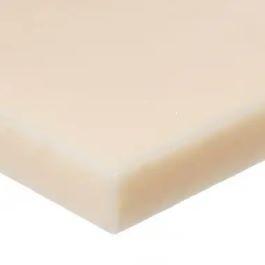Material Comparison of Acetal and Delrin

What is Acetal?
Acetal, also known as polyoxymethylene (POM), is a semi-crystalline, engineered thermoplastic used for precision parts that require high stiffness, low surface friction, and good dimensional stability. It is made in several slightly different formulations and sold under various brands. The differences between acetal plastics are minimal, but they are measurable.
Two general types of resins include copolymer acetal (POM-C) and homopolymer acetal (POM-H), known by its trade name, Delrin. Before we move forward to compare and contrast these polymers, it is important to note they are both acetal plastics. Therefore, they are generally interchangeable and share the same core benefits that acetal has to offer.
Acetal Copolymer (POM-C)
Acetal copolymers are made out of different types of monomeric units which combine to form a common polymer structure. They are free of centerline porosity, offering consistent properties throughout the shape.
A combination of low-stress levels and high strength assures flatness and dimensional stability. Copolymer grades are FDA, USDA, NSF, and 3-A Dairy compliant. They are available in a wider variety of colors, including black, blue, red, green, brown, and gray.
Trade names:
- Celcon®
- Duracon®
- Hostaform®
- Tepcom®
- Ultraform®
Acetal Homopolymer (POM-H)
Delrin is the trade name for the acetal homopolymer produced by DuPont. It consists of repetitive monomer units with a similar molecular structure exhibited by each unit. Compared to acetal copolymers, Delrin offers slightly better mechanical properties; however, it may contain a low-density center, or centerline porosity, especially in larger cross-sections.
Delrin is ideal for small diameter, thin-walled bushings that benefit from acetal homopolymer's additional strength and rigidity. It is commonly used in plastic machining due to its tensile strength and in injection molding due to its high flow rates.
|
Acetal Copolymer Advantages |
Shared General Properties |
Acetal Homopolymer Advantages |
|
|
|
Acetal vs. Delrin: Main Differences
The main distinctions between Delrin and acetal copolymers stem from their composition. As an acetal homopolymer, Delrin does not alter repeating CH2O units, while acetal copolymers contain different monomeric units in repeating CH2O units.
In other words, Delrin has a uniform crystalline structure rather than one that incorporates multiple subunits. When compared to acetal copolymers, this translates to better properties such as higher stiffness, flex fatigue resistance, and creep resistance.
A drawback concerning Delrin is increased centerline porosity. Prominent in thick slab and large diameter rod stock, it is an inconsistency in the center of the plastic caused by gas escape during the cooling process. Porosity in plastic means it may contain small bubbles or voids, which can allow glasses and liquids to seep inside the material. Specifically, this can be problematic in food and medical applications as centerline porosity increases the risk of bacteria growth.
Additionally, the strength of acetal copolymer can be increased more quickly because it can accept reinforcement much better than Delrin. However, they can both be modified with additives such as PTFE fiber, glass fiber, electrostatic dissipative, and electroconductive.
What are Acetal Plastics Used For?
While Delrin does have some distinguishing characteristics, as an acetal plastic, it is often interchangeable with acetal copolymer because many of their material properties are shared. Overall, acetal plastics are strong, rigid, and stable, making them desirable for many industries. They are often chosen as a cost-effective material replacement for metal components.
Industries:
- Automotive
- Industrial
- Electrical
- Consumer Goods
- Food Processing and Packing
- Construction
Uses:
- Gears
- Medical delivery devices
- Door system components
- Gaskets
- Nozzles
- Rollers
- Electrical components
- Valves
- Fasteners
Contact Us
For more information or inquiries about acetal products, please contact us at 888-839-0681 or service@fixsupply.com.


